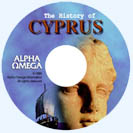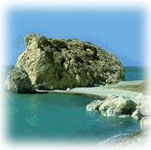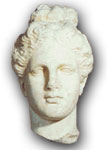 |
||||
|
Aphrodite, the Goddess of Eros and Cyprus "If we could, in fact, search some very ancient knowledge codified and enlisted in the ancient myths, certainly we would consider particularly apt the relation of Cyprus with its ancient goddess, Aphrodite. Aphrodite was born from the sea. So was also Cyprus..." Cyprus is indeed considered as the most probable "birth" place of the goddess, according to the general ancient Greek conviction. Cyprus is also considered as the most probable place of the formation of Aphrodite and the shaping of her known nature, mainly of the geographic position of the island, on the boundaries between East and West. In addition, the Greek presence in Cyprus (from the 14th Century BC onwards) contributed with its own influence in the shaping of the character of the goddess but also with her transfer to Greece where she was finally fully hellenized. The ancient rich reports of her relation with the mythical king of Cyprus Kinyras, reflect, in reality, exactly the external influences in the formation of Aphrodite in Cyprus. The eastern influences in the worship of Aphrodite in ancient Cyprus are also evident from the fact that, in some cases, the goddess seemed to be identified with Astarti of the Phoenicians. This is perfectly natural as many Phoenicians were living in Cyprus, they were also themselves Cypriots and indeed had a very great influence. Besides, according to the findings of archaeological research, the great Phoenician temple of Astarti in Kition had a parallel and related development (at least from the architectural side) with the great temple of Aphrodite in Palepaphos. Aphrodite was worshipped in all cities of Cyprus and in many other parts of the island (such as the cape of Apostle Andreas, Cape Greco, in a region near Morphou, etc.). In some cases she seemed to be identified (beyond her identification with Astarti) with Ariadni (Amathus ) and Isis (Soloi), too. In the Roman world, where she became a very important deity since the 3rd Century B. C., Aphrodite (Venus) received influences from Turan, goddess of the Etruskans. In Cyprus her worship continued to be particularly important during the period of the Roman rule, until the prevalence of Christianity. Aphrodite was the patron goddess of many cities of Cyprus, and for this reason she is testified with epithets like: Paphian, Idalian, Goglian. And we cannot accept that cities like Paphos, Idalion , Golgoi, Tamassos were possible to have as their patron goddess a profane deity. Nor can we accept that an especially serious, official and pancyprian institution of the Hellenistic and Roman Years, the "Koinon ton Kyprion / Confederation of the Cypriots", was possible to have under its own responsibility, on a pancyprian scale, celebrations for Aphrodite if these were obscene. In Paphos, as we have noted before, there are testimonies that Aphrodite was worshipped without a statue in her temple, but in the place of a statue there was a big pyramid shaped or conical stone. It seems that here, in her most ancient and most important sanctuary, they avoided even to give her a human nature - either male or female or both. In inscriptions found, Aphrodite is also mentioned as "Anassa" (Queen) since Cyprus was her kingdom on earth. With this epithet, indeed used as a principal name, the goddess is mentioned in many inscriptions from Paphos. In other inscriptions, the goddess is mentioned as "Golgia", since very early (already the Cypro-Archaic Period) she was worshipped in Golgoi. For the same reason she is also mentioned with the epithet "Paphian" (encountered in numerous inscriptions) but also "Kypris". Especially the epithet "Kypris" (= Cypriot) was used as a principal name by many ancient Greek writers. Exceptional texts praise the whole Cyprus as the island of Aphrodite, as the one of Euripides (Vakhai, 402 - 408): "...may I arrive in Cyprus, the island of Aphrodite, where the heart healing Erotes are mixing with the mortals, in Paphos where the hundred mouthed ravines of the barbarous river without rain bear fruit..." This choral, with the marvellous verses, gives a Cypriot picture of peace, joy, happiness and prosperity. A blessed place where "Erotes" (Eros) herd with common mortals, consequently, a paradise on earth which belongs to Aphrodite, the peaceful goddess. |
 |
|||

